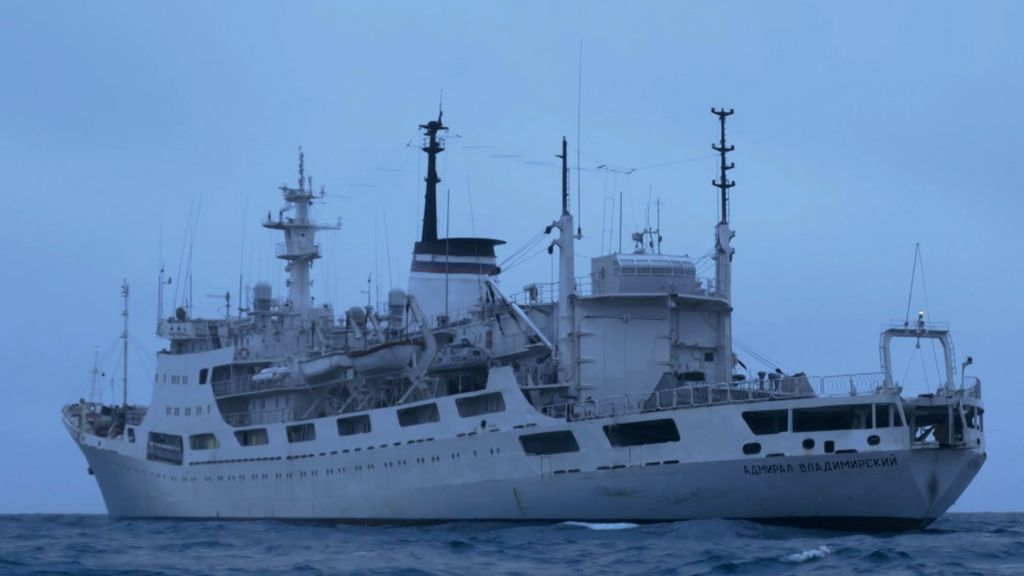NOS News•
Journalists from Danish, Norwegian, Swedish and Finnish public broadcasters have found new indications in a joint research project that Russia is developing plans to sabotage Western gas pipelines, electricity and internet cables at the bottom of the sea.
Journalists followed the movements of Russian ships in the North and Baltic Seas, spoke with experts and security agencies, and benefited from the interception of radio traffic. The result of their research can be seen in a documentary series that will air tonight.
The research confirms reports that Russia plans to sabotage critical NATO countries’ infrastructure at sea if it comes to war with the West.
Admiral Vladimirsky
Thus, a team of Danish broadcaster Dr In November in the strait between Denmark and Sweden, a Russian ship was reportedly engaged in mapping the seabed infrastructure there.
The Admiral Vladimirsky is a naval research vessel, but it will also be used to gather intelligence on gas pipelines, wind farms, power cables, and the Internet. She has turned off his AIS transceiver so that his location and other data are not visible to others.
The Danes managed to learn the location by intercepting information the ship had sent to a Russian naval base. The presenter sent a journalist and photographer to Vladimirsky on a speedboat. When he reaches the ship, masked men appear on deck and a heavily armed soldier wearing a bulletproof vest appears.
A journalist from Norwegian broadcaster NRK discovered a link between the destruction of an internet cable between Spitsbergen and the Norwegian mainland due to the movements of a Russian fishing boat. They were strange. “Transceiver signals show that Melkart-5 passed over the cable more than 130 times. More than 130 times, there and back.”
A Norwegian shipowner said it couldn’t be a coincidence. “It makes absolutely no sense for a fishing vessel. Even if there is an insane amount of fish. I’m not a fisherman, but this is not a normal activity.”
NATO exercise
Finnish broadcaster Yle writes That the Russian fishing vessel Taurus attracted the attention of journalists. She has called at a Norwegian port 51 times in the past 10 years, only 34 times with fish on board.
In the fall of 2018, it was spotted western Norway where a major NATO exercise was just underway. In December last year, she was on her way to the Barents Sea, about a month before the start of the fishing season.
According to the broadcasters, over the past ten years, the movements of more than fifty Russian ships should be considered suspicious.
Society paralyzes
“In the event of a conflict with the West, Russia knows where to strike to paralyze Danish society,” said the head of counterintelligence at the Danish intelligence agency PET. According to the Norwegian intelligence chief, the Kremlin attaches great importance to the operation and it is directed directly from Moscow.
The information collected by the Russians is stored centrally, according to DR. To be able to do this, a special program called GUGI has been developed for Russian sea, fishing and merchant ships.
This means that all Russian ships can be deployed for underwater warfare. According to an expert from the Norwegian Defense Academy, it is very easy for a non-naval ship to dispose of a naval mine in a specific location.
The Russian ambassador to Norway wrote in response to questions from the broadcasters that Russia is complying with international law.
Dutch intelligence services
The message posted on the Danish broadcaster’s website also refers to a press conference by the Dutch intelligence services AIVD and MIVD. They announced in February that a Russian ship had tried to collect information about wind farms in the North Sea last year.
Then MIVD director Swellens said that the Russians also want to map internet cables and gas pipelines. According to the devices, there were “preparations for disruption and sabotage”. Also in this case, Admiral Vladimirsky was, as a source told DR.
On the broadcaster’s website, no link has been made between the attacks on the Nord Stream 1 and 2 gas pipelines in the Baltic Sea last year. Who was behind it is still unknown.
Nieuwsuur presented this report last year on the vulnerability of submarine cables:







